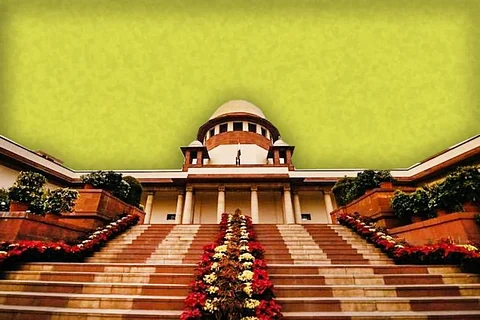In a significant order affecting politicians facing criminal cases, the Supreme Court on Tuesday curtailed the power of state prosecutors and ordered that they cannot withdraw prosecution against the lawmakers under the Code of Criminal Procedure (CrPC) without prior sanction from High Courts. A bench headed by Chief Justice NV Ramana expressed strong displeasure over the non-filing of requisite status reports by the Union governments and its agencies like CBI and indicated that it would set up a special bench in the top court to monitor criminal cases against politicians.
The order assumed significance in view of the fact, highlighted by an amicus curiae on the basis of news reports, that states like Uttar Pradesh, Uttarakhand, Maharashtra and Karnataka have sought to withdraw criminal cases against politicians by using section 321 of CrPC which empowers prosecutors to withdraw cases. UP is seeking to withdraw prosecution of (i) Sangeet Som, MLA from Sardhana (Meerut); (ii) Suresh Rana, MLA from Thana Bhawan Assembly; (iii) Kapil Dev, who represents the Muzaffarnagar Sadar seat in the Assembly (related to the Muzaffarnagar riots) and (iv) political leader Sadhvi Prachi.., the report of amicus curiae said and gave reference to similar cases sought to be withdrawn by other states.
The bench, also comprising Justices Vineet Saran and Surya Kant, noted the submission of the amicus in the matter who referred to various instances across the country, wherein various state governments have resorted to the withdrawal of numerous criminal cases pending against MP/MLA by utilising the power vested under Section 321, CrPC. "It merits mentioning that the power under Section 321, CrPC. is a responsibility that is to be utilised in the public interest, and cannot be used for extraneous and political considerations. This power is required to be utilised with utmost good faith to serve the larger public interest," it said.
The top court directed that no prosecution against a sitting or former MP/MLA. shall be withdrawn without the leave of the High Court in the respective suo-motu writ petitions registered in pursuance of its order. The High Courts are requested to examine the withdrawals, whether pending or disposed of since September 16, 2020, in light of guidelines laid down by this court, the bench said.
In another important direction, it ordered that judges of special courts hearing cases against the MPs and MLAs will not be transferred until further orders. The apex court said that to ensure expeditious disposal of pending cases, it is necessary to direct the officers presiding over Special Courts or CBI Courts involving prosecution of MPs or MLAs to continue in their present posts until further orders.
"This direction, barring the transfer of Judicial Officers, will be subject to their superannuation or death. If any further necessity or emergency arises, the Registrar General of the High Courts are at liberty to make an application before us for retention or to relieve those officers," the bench said.
It noted that the coronavirus pandemic scuttled many courts in effectively conducting trials, or recording evidence or hearing applications. Registrar Generals of all the High Courts are to provide information in a particular format about the cases decided by special courts against the lawmakers, the apex court said, adding that they will have to give details of pending cases and their stages before the trial courts.
Expressing strong displeasure over the non-filing of status reports as per the directions given in an earlier order, the bench said it was granting last opportunity to the Union government and its agencies to follow its orders and posted the matter for further hearing on August 25.
The agencies will have to submit detailed status reports regarding year-wise details on number of cases, pendency and their stage and the information has to be shared in advance with the amicus curiae before the next date of hearing. The bench also sought a comprehensive reply from the Union government on providing the video conferencing facilities in special courts for examining the witnesses and provision of funds for this.
The order came after the top court perused the report of senior advocate and amicus curiae Vijay Hansaria and lawyer Sneha Kalita, assisting the amicus curiae, in dealing with the PIL on the issue. The bench was hearing a PIL of 2016 filed by lawyer and BJP leader Ashwini Upadhyay on fast-tracking of criminal trials against MP and MLAs besides seeking a life ban on convicted politicians from contesting polls.
At the outset, the bench expressed dismay over the leak of the report before it came before the bench and said, "We are reading these reports in newspapers. They do not send us anything. We get everything in the evening..."
The bench referred to previous orders to highlight the non-compliance and said, "We have expressed our displeasure several times. We cannot say more than this...nothing is happening at your end."
"You have to understand this, when the matter had started, we were sure that the government was very much concerned about the disposal of these cases. But nothing has happened from your side," the bench observed. The law officer said the government was committed to speedy disposal of cases. We think that a special bench is required to be set up to monitor the cases to ensure speedy disposal, the CJI remarked.

